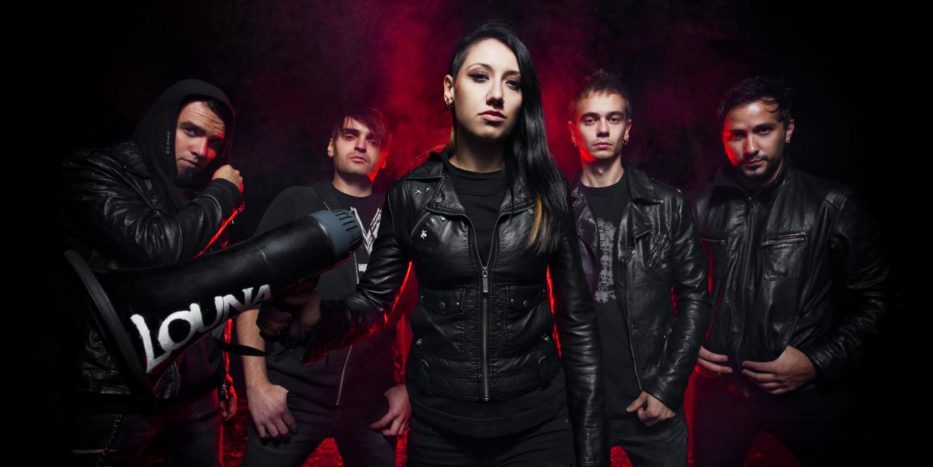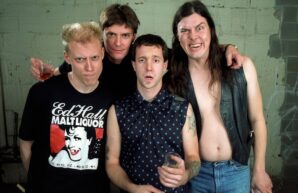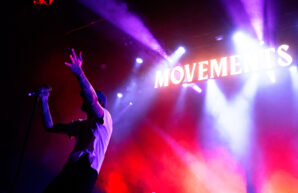 Russian rock sensation LOUNA is coming to the United States with the release of their album “Behind a Mask” on April 30. The album is a compilation of songs off their previous two albums translated into English for American fans.
Russian rock sensation LOUNA is coming to the United States with the release of their album “Behind a Mask” on April 30. The album is a compilation of songs off their previous two albums translated into English for American fans.
LOUNA is an award winning band, winning the 2009 “Best New Artist of the Year” Russian Alternative Music Prize (RAMP), 2011 “Rock Song of the Year” Nashe Award and the 2012 “Female Vocalist of the Year” Nashe Award.
They will also be featured in the MTV USA documentary “Rebel Music,” due out in the fall of 2013.
The Pit and Stephanie Sokol (The Oakland Post) were offered the chance to interview the Russian rockstars about their careers and love affair with music.
I suppose we should start at the beginning and get to know you guys a little better. When did LOUNA form and what was the main reason behind forming the band?
Lousine Gevorkyan (Lou): Me and Vit were in a nu-metal band called Tracktor Bowling, but that band’s musical and lyrical style were too restrictive for us to say the things we wanted to say in our songs so we decided to form Louna. All of us in the band are really excited about the band and love what we do. Together we’re doing our life’s work.
Vitaly Demidenko (Vit): Like Lou said, but I should add that we had already written some songs and knew for sure that we wanted to make a new group. We already knew a drummer so we started looking for guitar players in the summer of 2008. Through a friend I found Ruben. When I talked to Ruben, he suggested we bring in his friend Sergey as the second guitarist. Everything worked out perfectly so we started rehearsing together. After six months we recruited Pilot to replace our original drummer. Together we came up with the name Louna and have been together with the same line-up ever since.
Ruben Kazarian (Rou): Sergey and I had played in different bands together over the years. We shared some of our new ideas with the band and then started right away working on our songs. Very soon we realized that we have tons of music and a certain chemistry that was definitely happening. Right away we agreed that we would address the most pressing and sharp social issues in our lyrics. It was just natural, given the fact that the situation in the country began to actively stagnate, human rights were regularly violated, and those in power increasingly distanced themselves from solving social problems while at the same time plundering the country. We have been really angry about it and unfortunately nothing in our country has changed since Louna’s first day.
How much of your life has been dedicated to music and pursuing this career?
Lou: I’ve been in music in one way or another since I was 4 and I’ve been into rock since I was 18. For me, this isn’t a career. It’s my life.
Vit: and I’ve been playing bass for about 20 years. Sixteen of those years were with Tracktor Bowling with was the first Russian nu-metal group back in the day with female vocals. For several years we were the top band in Russia’s alternative music scene. I can honestly say that I’ve devoted over half my life to rock music. It’s who I am.
Leonid Kinzbursky (Pilot): Same. Music occupies 100% of my time. There’s nothing else.
Rou: For most of us music is everything. The band lives and breathes music 24 hours a day. I am the only exception because I have some other interests that I do not want to abandon and continue to develop. For instance, I am still working at the Institute of Oriental Studies of the Russian Academy of Sciences as a staff researcher for the Korean Department. That is a unique and valuable experience for me to be simultaneously in two drastically different worlds: the world of rock n’ roll and the world of science. This contrast is so refreshing and enriching that I haven’t been able to justify abandoning either.
Your first album, “Let’s Get Louder,” was released in December of 2010, but before that you released an EP that ultimately led to you winning the 2009 “Best New Artist of the Year” Russian Alternative Music Prize. What was it like to receive that honor so early in the band’s life?
Lou: When we started we were supported by Tracktor Bowling fans, but it was very touching for us knowing that people liked our new band and its songs.
Vit: I have tried in vain to understand how it’s possible that Louna has risen to the top at such a staggering pace. Maybe we just found the right combination of music, vocals, lyrics and all the other things that go into making a band what it is that just resonated with a lot of people quickly. We’ve worked very hard on our songs and on our live performance and so I guess this is just the result of that. But really, it’s unheard of for any band to get this popular so fast in Russia and I often think it’s some variant of the American dream, but just about Russian rock.
Rou: It was important for us as a band because it helped people to take notice of us who maybe otherwise wouldn’t have. It was an amazing opportunity and an even more effective as a way to be heard in other ways. That prize also helped us to consolidate our fan base and they in turn helped us a lot by talking about us and pestering their friends and their friends to listen to our music. Enthusiasm from our fans inspired us so much that even if we would have failed to get the prize it would not matter that much.
Your single “Fight Club” off that first album was named the winner of the 2011 “Rock Song of the Year” Nashe Award. What was your reaction to the second award in your band’s short existence?
Lou: Shock. It’s the biggest rock award in Russia from the most important radio station network in the country. So many people all across the country voted for us from places we didn’t even expect anyone to know who we were. The most important thing though was the love, devotion and faith that the fans who voted for us placed in us.
Vit: Absolutely. At the time we found out as we were sitting at the awards ceremony we were in complete shock. Just two years after our group started we entered the pantheon of Russian rock titans. It was what really made us believe that maybe we would be the group to save Russian rock music from the collection of aging bands by bringing some youthful energy to the scene.
Rou: Nashe radio is one of the biggest FM rock radio stations in our country so that was a huge step forward to breaking through to a larger audience. It was legitimate national recognition, and we saw the results of it almost immediately because attention to our band grew significantly. That and that we were invited to play on the main stage of the Nashestviye festival (Russia’s annual Woodstock) gave us the opportunity to be heard by largest rock audience in Russia.
You were recently awarded the 2012 “Female Vocalist of the Year” Nashe Award. What was the honor like specifically for vocalist Lousine Gevorkian and the band as a whole?
Lou: For me, I felt the love and belief that our listeners and fans put in us. I don’t see myself as some super-vocalist that the whole band depends on for survival. Everything we do is a team effort, all of us in Louna and our fans one in the same.
Vit: Of course when we realized that our front woman Lou was named the best female rock vocalist in our country we felt it was an honor for all of us. She beat a lot of famous Russian rock divas with long histories behind them. But maybe the most important thing about this award is that it’s not some back-room group of experts casting secret ballots and getting payoffs to choose winners like so many awards shows. What really makes this awards ceremony unique in Russia and the only really true and honest award show is that it is based on the results of the people’s votes from all across the country. We’re really happy for Lou and all of us are proud that she is the face and voice of our band.
Rou: I think both. First of all, of course this is recognition of Lou as the best female rock singer in the country – which already is true. And this fact reflects strange diversity – the lack of rock music and culture on the one hand and true talent of Lou as singer, front woman and creative personality on the other. And of course this is to a large extent the result of our collective work. We achieved this as a band. Lou reached that far as a member of the band.
“Behind a Mask” is set to drop on April 30th both in stores and online. What can you tell us about this album and its purpose? 
Lou: It a great compilation of our songs. It’s like a story. Like a book, songs which consider various problems of mankind. It’s powerful rock album, honest and strong. It was an exciting and challenging album to record and create. It was an interesting experience and we invested so much of ourselves and our nerves into it. We’ll see how people accept it or don’t.
Vit: Yes, and it’s a compilation of songs from both of our Russian albums. The songs were selected by our friend and producer Travis Leake. We relied on his judgment about what kind of songs western fans would be able to connect with. We trust him completely in this because after all, it’s his culture. I really hope that our lyrics especially will find their way into the hearts of Americans. We look forward to performing concerts in your country and releasing new albums in English.
Rou: All the songs on the CD were remixed from the scratch by one of the best sound engineers in the world and mastered by the absolute best mastering engineer that has probably ever lived at the famous Sterling Sound of New York. These songs to a large extent reflect our creativity during the last two to three years but with this new sound deliver even more energy and drive to listeners. We have carefully chosen particular songs from our previous two records and worked on vocal rearrangements so that international audiences can fully comprehend our message and enjoy our music and lyrical ideas as well. Our producer and English lyricist did a tremendous job adapting our Russian language lyrics and we are really proud of what we did. You definitely have to check out this album and I am sure every fan of heavy rock will find something in it that they will relate to on a personal level.
The album features 10 songs off your previous two albums, with each song adapted into English for the American album and mixed by Dan Korneff, one of the best in the business. What do you expect this album to do for LOUNA internationally and in the American rock scene?
Lou: I hope that people will understand our positions as humans, as citizen of the world, and we want to be honest and true in any language and in any country of the world. If people will give us a listen, I expect that people will figure out that know Russia also has strong, interesting, original and talented rock musicians.
Vit: First, we want to have our songs make sense not only to people in Russia but also to fans of rock music around the world. People from outside Russia have been leaving comments under our videos and sending us messages about our music asking for us to send them translations of our songs into English. Now they have the absolute ability to experience our music for themselves as it was meant to be felt by listeners not only with their ears, but with their soul as well. Secondly, because this album was mixed by Dan we are able to present the highest possible quality music to an international audience. We think that this will help to attract the attention of western concert promoters and then in turn we’ll have the chance to become the first band from Russia known outside of the country. Well, of course, not counting the glam rockers Gorky Park and the teenage pop singers from t.A.T.u.
Rou: With the exception of Gorky Park I do not remember any rock artist or rock band that has been successful in representing Russian music on the international stage. I really like and respect Gorky Park, I like their music and still have all their albums on my iPod, but that was 25 years ago and since then many things have changed in Russia. Russian rock has changed and developed into something that deserves its place in the history of music. We want to try show what people what we are all about. We have achieved considerable popularity in Russia, and I think that that gives us the right to represent Russian rock outside our country. We did a lot of work to make the Behind a Mask record sound great and reflect our musical and lyrical ideas in a language and form understandable by an international audience. We hope that people all around the world will give listen to us and to listen to the music of our country through us.
There will be two singles off the album, “Mama” and “Business.” This is the first time “Business” will be released as a single. What are the influences in these two songs and what was the reason to release “Business” as a single?
Lou: Mama is a song about what rock music means to us in our lives and about the way people choose to be in rock music forever. It’s a song for everyone–universal. In Russia it was (and still is) an absolute hit, because it’s true and emotional. Business however, is going to disturb people to their core. It will hit you between your eyes because it talks directly about one of the most serious problems in society. It’s honest. Honest to its very core. We really thought long and hard about whether or not to release Business as a single because of how very sensitive the subject matter is of the song. But, in the end, we decided to be bold and be ourselves. It’s a serious song that may cause a lot of pain for a lot of people, including possibly ourselves. In some ways we’re still concerned about how it will be received, but we hope that people are smart enough to understand the symbolism and ideas in both the song… and the video. It’s a song about love–real love of your fellow man, and the necessity of letting go of hatred to achieve that.
Vit: About the song Business, we decided to just smack people in the face from the get go and introduce western listeners of our future album with the most radical song we have ever written. It’s a risk. We know it’s a risk. We know we quite possibly will incur the puritanical, righteous wrath of some segments of America, as well as those from parts of the world where issuing death sentences against anyone who dares to criticize them is almost cliché. But in Russia we have a saying just like you do, “nothing ventured, nothing gained.” The song deals with the problems that religion causes in modern society. This is a subject very close to our hearts and something that everyone in this band believes in with all that we have inside ourselves, and we are not ashamed to say proudly that this song is absolutely what we believe. I think it’s important to say this before the song is released, well anyway I’m answering this question before the song is released, but it’s important to note that we in no way with this song single out any one religion. That’s all that needs to be said.
Rou: One of our strong and common convictions in Louna is atheism. We do not have anything against the beliefs that people have, but we are definitely against the Church as a form social organization and control. Unfortunately despite the advances in science, technology and knowledge the XXI century still has brought back the relics of the dark ages – religion has returned with a vengeance in Russia and in the world. That is an obvious result of the lack of education in our consumer driven society. Religion is a convenient tool to breed docile and unthinking people easily controlled and manipulated. Business is our statement against all this. Mama is a different story. This is how we see our fans and first of all ourselves coming to what we are now. I think the best way for me to describe Mama would be to cite Bon Jovi: “Welcome to wherever you are, this is your life. You’ve made it that far”
The music video for “Business” is said to be the most expansive and elaborate in Russian music history. Was there something specific that you wanted to do with this music video or did the cards just kind of fall into place for it?
Lou: It’s difficult for me to comment about the video really. I have only seen it once after the final edit was done before all the CGI was done. It’s still being finished now by some really amazing Hollywood CGI guys who live in Ukraine. I’m sure it’s going to be an epic video. The main thing is that we need people to understand its meaning, because again, the issue it raises in the song and video is very sensitive.
Vit: Not sure about Russian pop music videos, but as for rock videos it’s definitely the most ambitious and expensive. It’s so expensive because the script for it that our producer Travis wrote is basically like you’d expect to find in a movie. It’s really more than a video, more of a mini-movie. The video has CGI in almost every moment and the best people in the video field are working on it right now. There were very specific scenes, special decorations, costumes and a lot of different actors. It for sure made everything expensive beyond belief but I know it’ll be worth it.
Rou: We had someone who knew exactly what to do with the song, how to visualize its message and achieve a strong effect for viewers. We liked the idea and gave the man total freedom to do the project. We have to admit that he did a fantastic job especially when you consider that in Russia these kinds of projects are three times as hard to do as in any other country, and I bet you know the man I’m talking about.
LOUNA will be featured in the MTV USA documentary “Rebel Music” later this year. How were you approached about participating in this documentary and what is it about?
Lou: It’s about musicians who have the boldness to say what they think in their songs. It’s about society, about politics and business, about religion, etc. One of our friends and colleagues gave our contacts to the guys from MTV and they came and made a documentary about us.
Vit: I don’t know the exact details about how it came to be, but as I understand it it was because of our participation in the White Album project. The project is a collection of protest songs from Russian musicians released in support of Pussy Riot and other prisoners of conscience. The people who put that collection together gave MTV our name when they came to Moscow looking for musicians to feature in their documentary. So the crew came to Moscow and filmed some songs from our big solo concert in Moscow and came to our rehearsal studio the next day to film us and do an interview. We’re not sure what’s going to happen with it exactly, but we’re told it’ll be out soon.
The proceeds from “The Time of X” went toward Pussy Riot’s support and defense. Why are social issues, like the modern protest movement, important to you, and how is that incorporated into your music?
Lou: Some musicians are afraid to talk about or sing about what they think, or if they do they present it in some kind of humorous context or even worse they stay silent. These girls in Pussy Riot, they tried to draw public attention to what is happening right now in our lives and didn’t ask for permission from the government or go through “proper channels.” We are with them. We are one with them. We want people to know the truth.
Vit: Well, the proceeds from our album didn’t go there, but we most definitely did donate one of our songs to the White Album project which helps raise money for them. We’re professional musicians, not street performers. As musicians we believe it’s incumbent upon us to be active citizens. Our weapons are not violence. We fight with our words, our music and lyrics. We refuse to be quiet about what we see happening with our country that we love very much. We can see what is going on around us just like anyone else can. The vast majority of Russian musicians however just keep their mouths shut and sing about love and everything is roses and sunshine because it’s safer and easier for them. We don’t bullshit people. We talk straight about what we care about. It’s not right that modern society should have the kind of problems that we have in Russia and rock music has ALWAYS been the music of rebels. It’s really sad that most rock stars today have abandoned that simple truth.
Rou: Well, actually we as a band collectively do not support Pussy Riot’s performance in that cathedral. That was stupid and disrespectful towards believers. However we are strongly against the public demonstration of state supremacy in the way they were punished. It was 100% supported by the State and the Orthodox church. That was obvious and disgusting. This is just an illustration of what we protest against. Our protest stretches much further and wider. We protest against the system. We protest against capitalist greed and market economy values that place higher value on profit than people. We protest against the socio-economic and political system that oppresses the world in the interest of minority, what you call the 1%. The monstrous misbalance that is growing on between those who take and those who give is leading to worldwide disaster. The best example of this can be found in our song “The End of Peace” which was written during the worldwide riots and occupy Wall Street movement period.
“Behind a Mask” has only 10 to 15 seconds of vocal corrections throughout the entire album. How do you feel about the use of auto tune corrections in music? Is there ever a place for it?
Lou: No. I’m against auto tuning. Even if I hear a wrong note but I hear real emotion I’ll leave the note wrong. Emotion is the most important thing. There no place in rock music for it. I really don’t even think there’s that much tuning as you just described. I’m only aware of one small place that had to be adjusted because of a cross fade, but that’s boring for your readers to even hear about I think.
Vit: We have the good fortune of working with the very best vocalist in the country in Lousine Gevorkian. She is not only a brilliant singer but she’s also self-taught. As we say, “a talented person is talented in everything.” So when she records the vocals, she does it in one or two takes and doesn’t need any tuning to make her sound correct. You’ll understand when you hear her sing live.
Rou: We all have our own opinions. As far as I’m concerned everything is fine in moderation. When you record something there are takes that are absolutely great from the point of view of energy and drive and emotion but have some small imperfections that can be easily be edited. I think that using auto tune (as well as copy/paste techniques) are okay in such instances.
Finally, what do you hope fans take away and learn from LOUNA after listening to “Behind a Mask?”
Lou: Be honest, true, brave, open minded, kind and smart…and think of each other.
Vit: I hope that our music will help people in the west to understand that Russia also has high quality rock music with profound lyrics. Really, more than anything, I just want people to understand that they have brothers and sisters on the other side of the ocean who dream of justice, who love, and who want equality in this world. Perhaps music can be the thing to bring our two countries together at a human level, because our leaders have absolutely failed all of us.
Rou: That is a personal thing. In general I think that our message is clear. And I am sure it will be delivered and understood by the majority of people. All I want to say is please pay attention to this record. It has a lot to say. We did a lot of hard work and we represent a massive and different culture.





